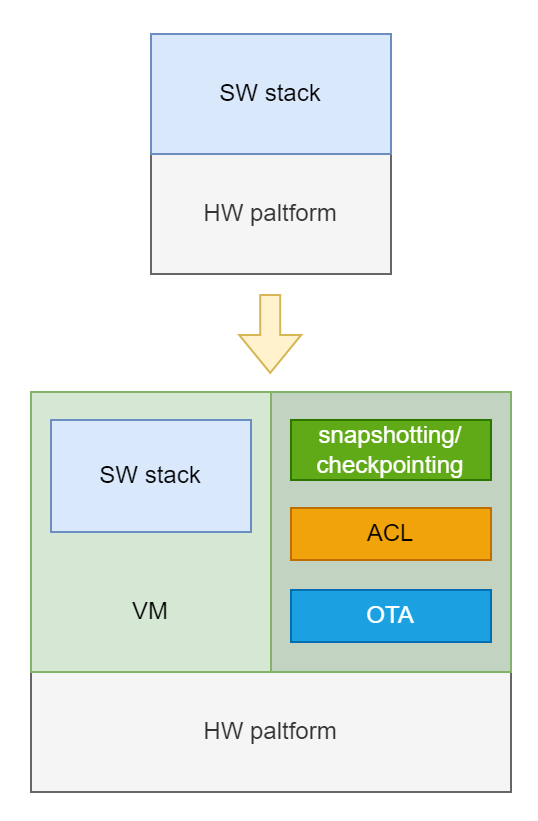VOSySzator: Virtualization Framework for Embedded Systems

Virtual Open Systems knows how portability is a fundamental requirement for a software stack, especially in the quickly evolving world of embedded systems. Portability can be tackled in many ways, from the user API level, to more low-level API like driver interfaces or kernel subsystems. The Virtual Open Systems approach is based on virtualization; as a virtual machine is, by definition, portable as it can be moved from platform to platform with ease, given that the proper virtualization support is provided. On the other hand virtualization involves often para-virtualization and, in the worst case, device emulation.
Although these are all techniques that go into the direction of portability, they are generally introducing overhead in the system, affecting its efficiency. This eventually translates into reduced battery life on mobile devices or a less responsive user interface in IVI or kiosk-alike systems, edge-IoT, IIoT, etc. It is fundamental to equip the virtual machines with technologies that allow to directly exploit the hardware platform and all its potential such as, for example, device attachment.

To tackle with this challenge, Virtual Open Systems develops a solution, called VOSySzator, that targets system integrators and OEMs to smoothly move their BSPs to a virtualized execution. It provides easy-to-use tools and runtime to fully exploits the capabilities of the platform, albeit benefitting from virtualization solutions and all its related advantages, like full control over accessed devices memory, simplified and safe OTA procedures with immediate roll-back and transparent restore points mechanism. All in all, VOSySzator aims at an increased system availability and minimal down-time in edge-IoT devices, set-top boxes, routers, kiosks and in general embedded appliances.
Among its features, VOSySzator provides the the freedom to:
- Configure the memory layout of the virtual machine,
- Selectively pass-through physical devices into the virtual machine to limit the exposure of the hardware to the software,
- When needed, mediate the access of the guest to existing devices and implement ACL-like functionality,
- Configure low-overhead periodic snapshotting/checkpointing.
Virtual Open Systems Contact
For any inquiry related to VOSySzator product and custom development services you can contact us.
- Kvm performance
- Virtual bfq
- Vosyshmem zerocopy
- Vosysmonitor
- Api remoting
- Vosyswitch nfv virtual switch
- Accelerators virtualization interface
- Vosysmonitor jp 日本語
- Vosysmonitorx86 jp 日本語
- Vosysiot edge
- Vfpgamanager
- Vosysvirtualnet
- Vosysmcs
- Vosystrustedvim
- Vosysmonitor sossl framework
- Vosysmonitorx86
- Vosysmonitorv risc v
- Vosysmonitorv risc v jp 日本語
- vosysvirtualnet jp 日本語
- Vmanager
 VOSySofficial
VOSySofficial




